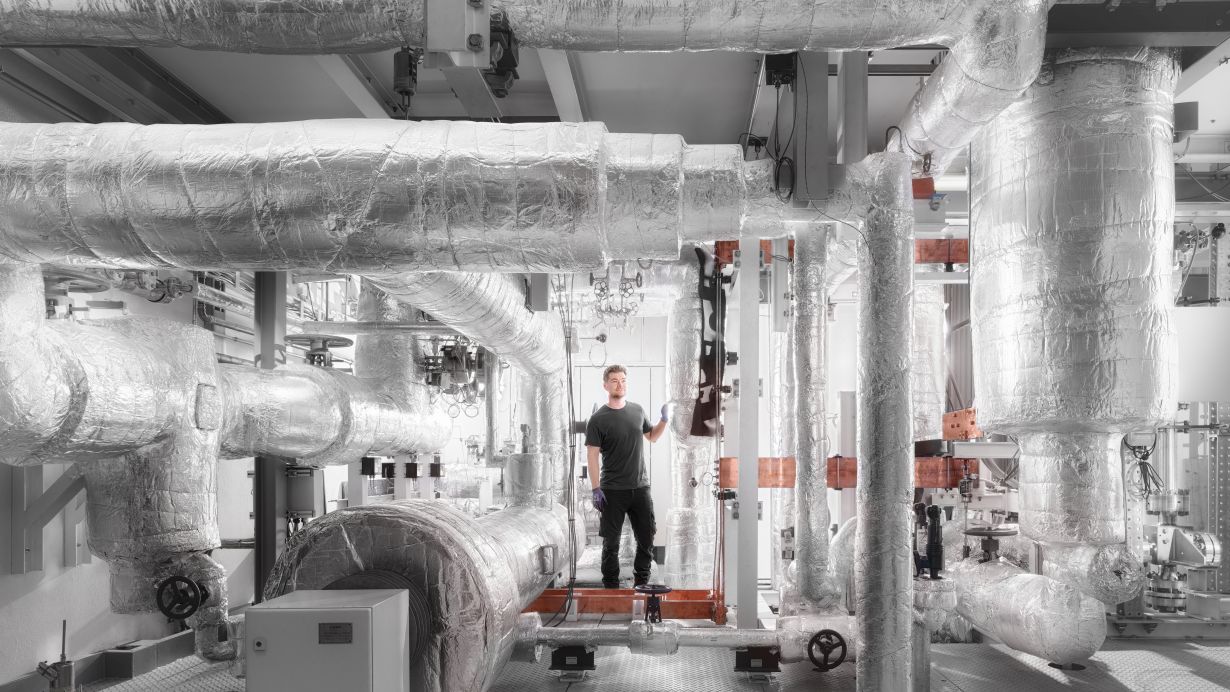Examining complex heat transfer processes in detail, even under extreme conditions such as those found in power plants and industrial plants – this is now possible with the COSMOS-H research facility at Karlsruhe Institute of Technology (KIT) which was opened on Thursday, May 8, 2025. For the first time, scientists have an infrastructure at their disposal to investigate flow and boiling phenomena in detail, even under realistic high-pressure conditions.
“Our new COSMOS-H research facility gives us more experimental options and strengthens KIT as a research location,” said Professor Jan S. Hesthaven, President of KIT at the opening ceremony. “It allows us to investigate complex thermal flow phenomena in a controlled manner using advanced measurement methods, making an important contribution to the safety and efficiency of future energy systems.”
COSMOS-H (which stands for Critical heat flux On Smooth and MOdified Surfaces – High pressure) is a thermohydraulic test facility for water-steam experiments under high-pressure conditions of up to 160 bar. It offers extensive possibilities thanks to an installed thermal output of 1.8 megawatts and temperatures of up to 360 degrees Celsius. “With COSMOS-H, we can investigate heat transfer and transient boiling phenomena under realistic conditions for the first time, just like in a real power plant,” said Professor Daniel Banuti, Head of the Institute for Thermal Energy Technology and Safety (ITES) at KIT. “This is really important for developing safe and efficient energy systems.” In the future, these findings could help to make industrial plants and power plants safer and more efficient, including nuclear reactors and concentrated solar power systems. “We are convinced that our research results will make an important contribution to the energy transition,” said Banuti.

Thermal Energy Technology and Safety (ITES); Professor Daniel Banuti, ITES;
Professor Jan S. Hesthaven, President of KIT; and Dr. Walter Tromm, scientific
spokesperson of the KIT Energy Center (Photo: Markus Breig)
Unique High-pressure Experiments
When working with COSMOS-H, all experimental boundary conditions such as pressure, temperature, flow rate, and heat output can be precisely controlled. This allows researchers to recreate the exact conditions in the experiment as would occur in a real thermal power plant. During operation, scientists can control and monitor the plant with the help of more than a hundred high-resolution sensors. The part of the system in which the actual experiments take place consists of a modular pressurized shell, containing high-performance heaters and thermocouples as well as numerous pressure sensors and flow-measurement technology. “We can flexibly adapt the experimental setup and the measuring devices to the specific requirements of each experiment,” explains Dr. Stephan Gabriel from ITES, who has been in charge of setting up the system since 2014. By using high-pressure sight glasses specially developed for this purpose, the researchers were also able to apply modern optical measurement methods in conjunction with image evaluation methods. “A robotic system is used to precisely move and position high-speed cameras during the experiment. This allows us to use the complex measuring technology at several measuring points simultaneously during an experiment,” said Gabriel.
More about the KIT Energy Center
In close partnership with society, KIT develops solutions for urgent challenges – from climate change, energy transition and sustainable use of natural resources to artificial intelligence, sovereignty and an aging population. As The University in the Helmholtz Association, KIT unites scientific excellence from insight to application-driven research under one roof – and is thus in a unique position to drive this transformation. As a University of Excellence, KIT offers its more than 10,000 employees and 22,800 students outstanding opportunities to shape a sustainable and resilient future. KIT – Science for Impact.

